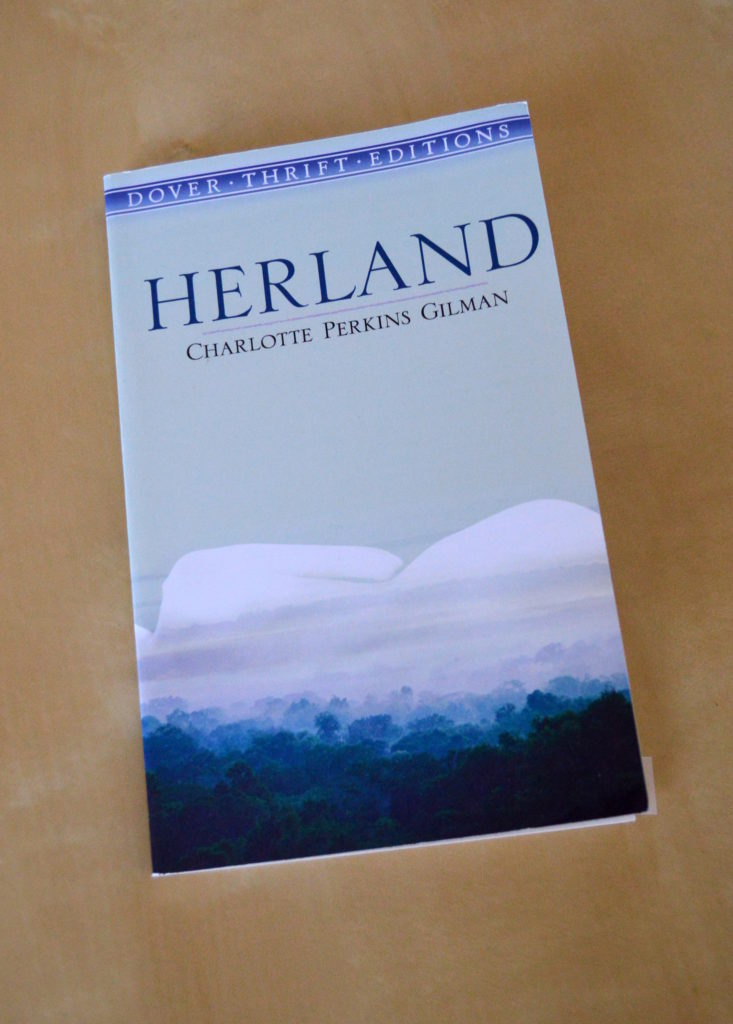Search “fake feminism” into Google. You’ll find endless think pieces on privilege, Ivanka Trump and Taylor Swift. But the thing that all those articles have in common is highlighting the way feminist rhetoric—any rhetoric—is used by those who promote causes that oppress women.
Charlotte Perkins Gilman was one of history’s most prominent “fake feminists.” Her 1915 novel, “Herland,” is considered the first feminist utopian story, and is the most rhetorically prophetic book I’ve ever read.
“Herland” follows three male sociology students who create an expedition party to explore a land rumored to consist of only cisgender women. The trio eventually find Herland, a pacifist paradise of pagan women who reproduce through parthenogenesis. “Herland” contains no acknowledgement of the complexities of gender or sexuality; all of its characters are cisgender, and for a novel about female separatist society, it is aggressively straight. “Herland” follows the three as they learn to adapt to their new home, find wives in Herland, and eventually face repercussions for attempting to rape a Herland citizen.

Gilman was a propagator of the masculine-feminine dichotomy; her brand of feminism was characterized by her opposition to what she believed to be masculine traits like violence, impulsivity and competition. She was a racist who supported slavery well into the 20th century, and as an advocate of euthanasia for the terminally ill, she committed suicide by chloroform after being diagnosed with breast cancer in 1935.
The world of “Herland” is not a matriarchy, but a filiarchy—the women of “Herland” are obsessed with children, and motherhood is treated with divine respect. In “Herland,” what makes a woman is her womb. Herland isn’t a land of frolicking sapphic Amazons; it is a land of neurotic mothers and fertile nymphs whose lives are made whole by the introduction of men.
The attitude towards abortion in Herland is evidence for its filiarchal tendencies. When male explorers arrive in Herland, they serve as a proxy for the reader, asking questions of Herland’s inhabitants. Our narrator, Van Jennings, reveals the existence of abortion outside of Herland, eliciting this exchange:
“’Destroy the unborn—!’ [Somel, a Herland citizen] said in a hard whisper. ‘Do men do that in your country?’
… I told her of certain criminal types of women—perverts, or crazy, who had been known to commit infanticide.” (p.70)
“Herland” is anti-abortion, “pro-woman” propaganda distilled; it hearkens back to the controversy that surrounded the presence of anti-abortion groups at the 2017 women’s march, raising the question of whether one can be both a feminist and staunchly opposed to abortion. Positioning itself as a feminist paradise where abortion is unheard of, Herland posits the dangerous idea that yes, it is possible to be an anti-abortion feminist, to support the total liberation of all women except in one critical area.
“Herland” is a valuable read because it allows people to understand the trap of motherhood-centered feminism. The novel is a manifesto of the primitive feminist movement of early America, of Republican mothers and Daughters of Liberty. The basic tenet of feminism is the idea that women are people, so “Herland” suggests that if women can’t be valued as people, perhaps they could be valued as wombs with legs. “Herland” also uses the essentialism of the masculine-feminine dichotomy to promote the idea that a woman is incomplete without a man, an idea as creatively dehumanizing as the idea that a woman’s most treasured secret is her womb.
I hope you’ll consider reading “Herland.” It’s out of copyright, and it’s easily available online for free. But mostly, I want you to walk away from your screen with the discerning knowledge of the way that even motherhood itself can be used as a weapon against women’s autonomy. And I offer you a sorry congratulations; you’ve just learned the great rhetorical secret that drives the anti-abortion, “pro-woman” movement.
Here is a free link to “Herland” from Project Gutenberg:
